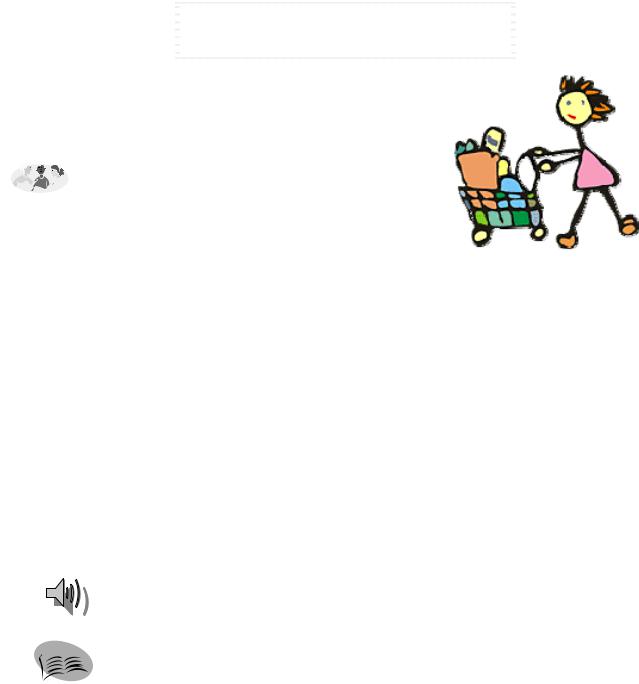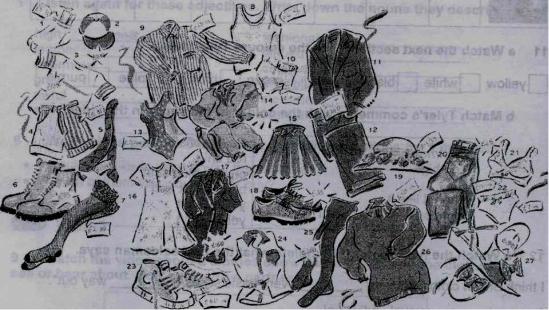
ulianova_ov_grichin_sv_i_dr_general_english
.pdf
3.4 Вам предстоит прочитать тест THE BRITISH vs
 AMERICANS. Перед чтением скажите, к кому относятся следующие утверждения:
AMERICANS. Перед чтением скажите, к кому относятся следующие утверждения:
a) the British b) Americans.
1.They are never tired of saying “thank you”, “I’m sorry”, “Beg your pardon”.
2.They don’t like boasting and showing off in manners, dress, or speech.
3.The society is characterized by less social distinction.
4.One doesn’t always address a person by his title?
5.People take their seats in queues at bus stops in a quiet orderly manner.
6.Students do not rise when the teacher enters the room.
7.They use first names when calling each other, joke, and slap on the back.
8.Ordinary people seem to remain good-tempered and cheerful under difficulties.
9.There is little noisy behaviour in the street.
10.Their speech is free and slangy.
3.5Прочитайте текст и проверьте свои ответы
THE BRITISH vs AMERICANS
One of the most striking features of English life is the self-discipline and courtesy of people of all classes. There is little noisy behaviour, and practically no loud disputing in the street. People do not rush excitedly for seats in buses or trains, but take their seats in queues at bus stops in a quiet and orderly manner.
Englishmen are naturally polite and are never tired in saying "Thank you", "I'm sorry", "Beg your pardon". If you follow anyone who is entering a building or a room, he will hold a door open for you. Many foreigners have commented on a remarkable politeness of the English people.
English people don't like displaying their emotions even in dangerous and tragic situations, and ordinary people seem to remain good-tempered and cheerful under difficulties.
The Englishman does not like any boasting or showing off in manners, dress or speech. Sometimes he conceals his knowledge: a linguist, for example, may notmention his understanding of a foreigner's language.
121
The Englishman prefers his own house to an apartment in a block of flats, because he doesn't want his doing to be overlooked by his neighbours. "An Englishman's house is his castle."
American society seems to be much more informal than the British in some ways, is characterized by less social distinction. Students do not rise when a teacher enters the room. One does not always address a person by his title, such as "Major" or "General" or "Doctor".
However, it is best to use a person's title when first meeting him/her, and then allow the person to tell you how he/she wishes to be called.
They use first names when calling each other, slap on the back, joke and are much freer in their speech, which is more slangy than the conventional British English. You will often hear the word "Hi" (a form of greeting among friends) used instead of the usual “Hello”, and "Howdy" instead of "How do you do?"
Those who don't easily show these signs of friendship are called "snooty" or snobbish." In contrast, people who show such simple signs of friendship, particularly to their own economic and social inferiors, are praised as "regular guys," or as "truly democratic." As a description of character, democratic is generally used to signify that a person high social or economic status acts in such a way that his or her inferiors are not resided of their inferiority.
|
Слова для запоминания: |
|
||
striking |
поразительный |
distinction |
отличие |
|
feature |
черта, особенность |
respectful |
уважительный |
|
courtesy |
учтивость |
to slap on the back |
||
disputing |
спор |
похлопывать по спине |
||
to rush |
бросаться, |
inferior |
нижестоящий |
|
устремляться |
to signify |
обозначать |
||
excitedly |
взволнованно, |
to remind |
напоминать |
|
возбужденно |
inferiority |
низшее положение |
||
good-tempered уравновешенный |
consciousness |
сознание |
||
cheerful |
неунываюищй, |
to be likely |
|
быть склонным |
веселый |
|
superior |
|
выше стоящий |
to boast |
хвастаться |
to observe |
|
наблюдать |
to show off |
красоваться |
social occasion |
социальная |
|
to conceal |
скрывать |
ситуация |
(зд.) снимать |
|
to mention |
упомянать |
to remove |
||
to overlook |
смотреть за, |
|
|
|
наблюдать |
|
|
|
|
122
3.6Ответьте на вопросы.
1.How do foreigners characterize English people?
2.What examples of remarkable politeness of English people are mentioned in the text?
3.Why does the Englishman prefer his own house to an apartment in a block of flats?
4.What is the meaning of the proverb “An Englishman’s house is his castle”?
5.How do Americans differ from the British?
6.Who is called “snooty” or “snobish” in America?
7.What does it mean “to be truly democratic”?
8.How do Americans address each other?
3.7Переведите на английский.
Вежливость и самодисциплина – отличительные черты английского национального характера. Англичане сдержаны, они не любят шумное поведение и громкие споры. В Англии считается дурным тоном хвастаться и выставляться напоказ. Англичане никогда не устают говорить «Спасибо» «Извините» «Прошу прощения».
В Американском обществе существует меньше социальных разграничений. Американцы более неформальны и свободны в беседе. Они предпочитают обращаться друг к другу о имени, не используя званий или уважительного обращения «Сэр». В Американской речи больше сленга чем в традиционном английском. Американцы любят быть демократичными. Это означает, что люди высокого социального положения не напоминают нижестоящим о своем превосходстве.
3.8 Расскажите о русском национальном характере в небольшом сочинении.
123

PART 6
SHOPPING
Unit 1
Shopping: a pain or a pleasure?
 1.1 Обсудите с партнером.
1.1 Обсудите с партнером.
•How many different kinds of shops can you think of?
1.2 Соотнесите названия магазинов с названиями товаров, которые можно там купить.
Example: baker's- bread, cakes
Shops |
Things |
|
baker's |
bread |
birthday cards |
butcher's |
beef |
magazines |
greengrocer's |
vegetables |
fruit |
newsagent's |
medicine |
kittens |
pet shop |
puppies |
newspapers |
florist's |
flowers |
pork |
1.3Пролушайте текст MY UNCLE IS A SHOPKEEPER

 дважды и запишите его на английском языке.
дважды и запишите его на английском языке.

 1.4 Прочитайте статью и ответьте на вопросы.
1.4 Прочитайте статью и ответьте на вопросы.
1. Who doesn’t like shopping? Simon and __________
2.Who likes shopping slowly and carefully?
__________
3.Who likes shopping with certain people?
__________ and __________
4.Who enjoys shopping alone?
__________ and __________
124
Some women include shopping in their list of favourite activities. Men traditionally hate it. Here's what some of our readers think.
Aisha, 32
I like shopping, but it depends who I go with. Trying to shop with young children is a nightmare! I don't like shopping with my husband either because he's always in a hurry, and worries about spending money. But shopping with friends is fun, and I like going on my own too.
Simon, 28
I don't really enjoy shopping. In fact it's a pain! I find it stressful because I'm always afraid of making mistakes. I've got a collection of awful 'mistakes' at the back of my wardrobe, which I never wear! But I don't mind going with my girlfriend, because she helps me choose. I think women are better at buying clothes than men. They've got better taste and they always know what's in fashion.
Ivan, 30
I'm not interested in shopping at all - in fact I hate it. My wife buys all my clothes and brings them home. I try them on and if I like them, I keep them. If not she takes them back. Choosing things from catalogues and the TV shopping channels is the only kind of shopping I enjoy.
Rosa, 24
I love shopping, but not on a Saturday or during the sales, when the shops are really crowded. I prefer shopping alone. Buying things often takes me a long time because I never buy the first thing I see. I always look around other shops to see if I can find the same thing cheaper. I'm quite good at finding a bargain. I hate shopping in large supermarkets, and prefer buying food in small shops or street markets.
1.5 Определите, к кому из героев статьи относятся следующие утверждения. Одно предложение лишнее.
Aisha |
Simon |
Ivan |
Rosa |
1.It is difficult to choose the “right” clothes.
2.It is better to shop during the sales.
3.Shopping with children is awful.
4.This person always looks for cheaper things.
5.This person prefers to shop.
125

1.6 Определите, в каких магазинах были произнесены реплики a – g.
|
|
|
|
|
|
at the chemist's |
|
A A dozen of cinnamon buns, please. |
|
|
|
|
|
|
|
|
|
|
|
|
at the greengrocer's |
|
B Have you got a black pair - size 8? |
|
|
|
|
|
|
|
|
|
|
|
|
at the baker's a |
|
C A bottle of cough medicine, please. |
|
|
|
|
|
|
|
|
|
|
|
|
at the newsagent's |
|
D A first-class stamp, please. |
|
|
|
|
|
|
|
|
|
|
|
|
at the post office |
|
E A pint of Guinness, please. |
|
|
|
|
|
|
|
|
|
|
|
|
at the pub |
|
F How much are the carrots? |
|
|
|
|
|
|
|
|
|
|
|
|
in a shoe shop |
|
G The Daily Mirror and Hello! magazine |
|
|
|
|
please. |
|
|
|
|
|
|
|
|
|
|
|
1.7Скажите, куда вы пойдете, если вы хотите купить:
YOUWANT |
GOTO |
||
1 a pair of shoes or boots |
post office |
||
2 |
medicine |
boutique |
|
3 |
fish, a crab |
optician's |
|
4 |
sausages, meat |
shoe shop |
|
5 |
a haircut |
chemist's |
|
6 |
potatoes, apples |
baker's |
|
7 |
a pen, paper-clips |
dry-cleaner's |
|
8 |
whisky, wine |
fishmonger's |
|
9 |
a bunch of roses |
stationer's |
|
10 |
a newspaper |
furniture shop |
|
11 |
cigarettes, matches |
ironmonger's |
|
12 |
a loaf of bread |
butcher's |
|
13 |
stamps |
off-licence |
|
14 |
a sofa |
hairdresser's |
|
15 |
the latest fashion |
greengrocer's |
|
16 |
a ring, a necklace |
jeweller's |
|
17 |
to clean a jacket/skirt |
newsagent's |
|
18 |
a screwdriver, a hammer |
bank |
|
19 |
a new pair of glasses |
tobacconist's |
|
to cash a cheque |
florist’s |
||
126

1.8Прослушайте несколько диалогов и определите, в



 каких магазинах они состоялись.
каких магазинах они состоялись.
1.9 Прослушайте диалоги еще раз и воспроизведите английские фразы, обозначающие следующее:
1.Я Ищу Джен Эйер Шарлотты Бронте. Она у вас есть?
2.У вас есть эта вещь моего размера?
3.Вот, пожалуйста.
4.Не хотите ли примерить?
5.Примерочная справа.
6.Что-нибудь еще?
7.Извините, я не могу найти сахар.
8.Пойдемте, я покажу.
 1.10 Составьте диалоги, используя следующие ситуации.
1.10 Составьте диалоги, используя следующие ситуации.
1 in a chemist's |
2 in a clothes shop |
3 in a post office |
|
conditioner |
a shirt/tie |
some stamps |
|
First or second class? |
|||
shaving foam |
What size are you? |
||
a letter/postcard to |
|||
small/medium/large |
|||
deodorant |
Japan |
||
too small/too big |
|||
stomach ache |
I'll have it, please. |
send this parcel to |
|
Mexico |
|||
sore throat |
I'll leave them, thanks |
||
buy some envelopes |
|||
|
|
||
1.11 Обсудите с партнером |
|
||
1.Do you enjoy shopping? Why (not)?
2.Do you like shopping ...? Explain why.
•at the sales
•by post from catalogues
•in large supermarkets
•from TV shopping channels
•in street markets
3.Do you prefer shopping alone or with somebody? Who?
4.Are you good at finding bargains?
5.Have you ever bought anything that you've hardly ever worn? Which of the four people in the magazine article in activity 4 are you most like?
127

1.12 Расспросите своего партнера и напишите краткий рассказ об его отношении к покупкам и магазинам.
•How often do you go shopping?
•Do you have a favourite kind of shop?
•How much money do you spend on yourself every week?
•What sort of things do you spend your money on?
•Where do you prefer to shop: in a market or in a department store?
Unit 2 What’s in fashion?
 2.1 Обсудите с портнером.
2.1 Обсудите с портнером.
•What clothes style is fashionable now in your opinion?
•Who is really fashionable in your group/class?
•What kind of clothes was fashionable at the beginning of the 20th century? In he 1950s? In the 1980s?
2.2 Прочитайте текст о моде прошлого века и

 заполните пропуски подходящими датами. (90s, 80s, 70s, 60s,)
заполните пропуски подходящими датами. (90s, 80s, 70s, 60s,)
DO YOU THINK YOU'RE FASHIONABLE?
What did your granny or your dad use to wear?
1Fashion went mad in Britain in the ……….s. Clothes were made from exciting new materials like shiny plastic and even paper. Women used to wear very short skirts and long shiny black plastic boots. Sometimes the boots went over their knees. Young men used to wear bright colours. They wore wonderful patterned shirts with wide collars and big ties. Their hair was quite long.
2........Very full skirts were in fashion for young women in the ………. s. They often used to wear gloves, sometimes even indoors. Teenage girls sometimes used to wear short white cotton socks and flat shoes. Some
128

young men, who were known as 'teddy boys', used to wear very narrow ties and narrow trousers. Their shoes or boots sometimes had high heels and pointed toes.
3 Women used to wear long straight dresses in the ………. s.
They ended just below the knee and didn't have a waist. The dresses often used to have a belt around the hips. Women liked wearing scarves and beads round their necks. Their hair was very short and they always used to wear hats when they went out. Men used to wear trousers with very wide legs. They often wore hats and flat caps.
4 .......Very short T-shirts were the latest fashion in the ………. s.
Girls used to wear them with jeans. Everyone wore trainers. Teenagers used to wear a lot of jewellery in their ears, noses and even tongues and they painted their nails in crazy colours. Young men used to have very short hair and they used to wear baseball caps and loose trousers. Sweatshirts and jogging trousers were very popular.
2.3Соотнесите картинки с абзацами статьи.
2.4 Прочитайте статью еще раз и расскажите об одном из периодов.
129

2.5Назовите предметы одежды с помощью данных слов.
shirt |
socks |
jumper |
skirt coat tie underpants |
blouse cap sandals |
|
vest |
shorts |
jacket |
trousers jeans shoes dress tights |
swimsuit |
|
stockings knickers |
hat trainers T-shirt boots |
tracksuit |
bra |
||
2.6 Распределите слова из предыдущего упражнения по категориям.
Things that you wear:
•on your head
•above your waist
•below your waist
•on your feet
2.7Найдите прилагательные с противоположным значением.
a) |
short |
tight |
|
loose |
high |
|
thin |
wide |
|
large |
patterned |
|
low |
dull |
|
narrow |
long |
|
plain |
small |
|
bright |
thick |
130
